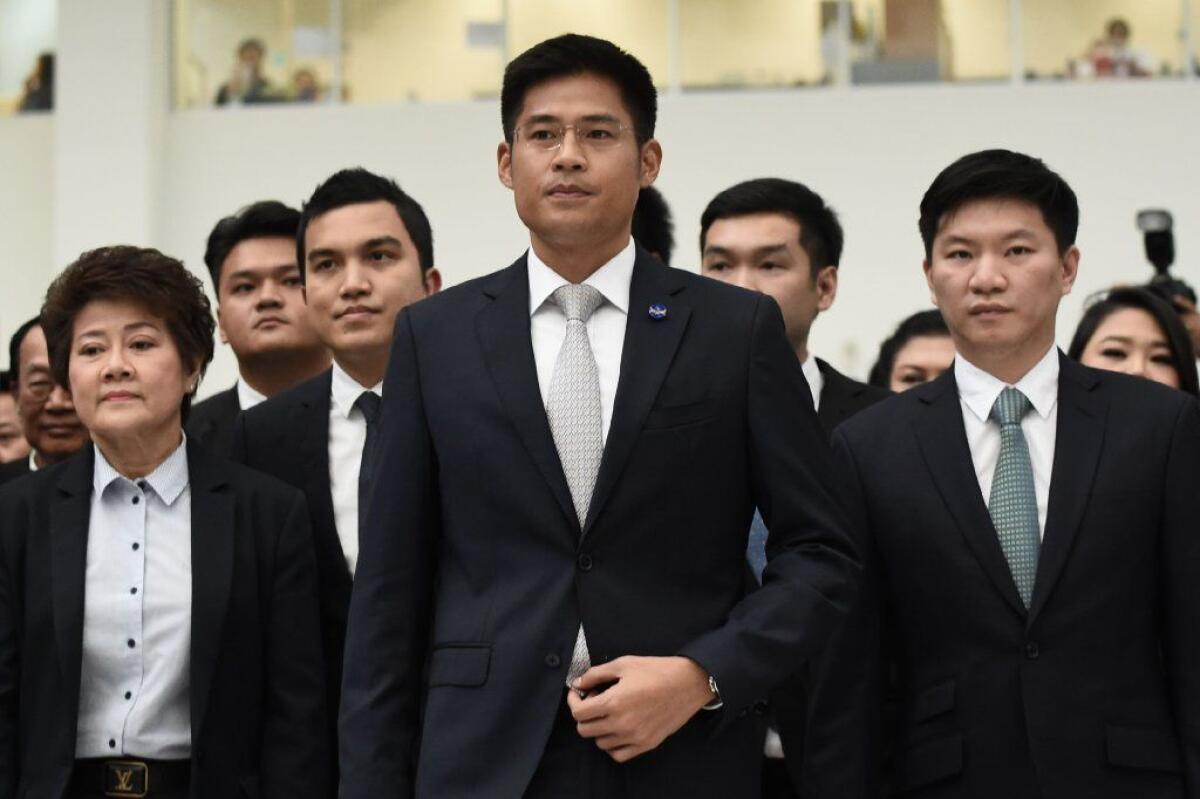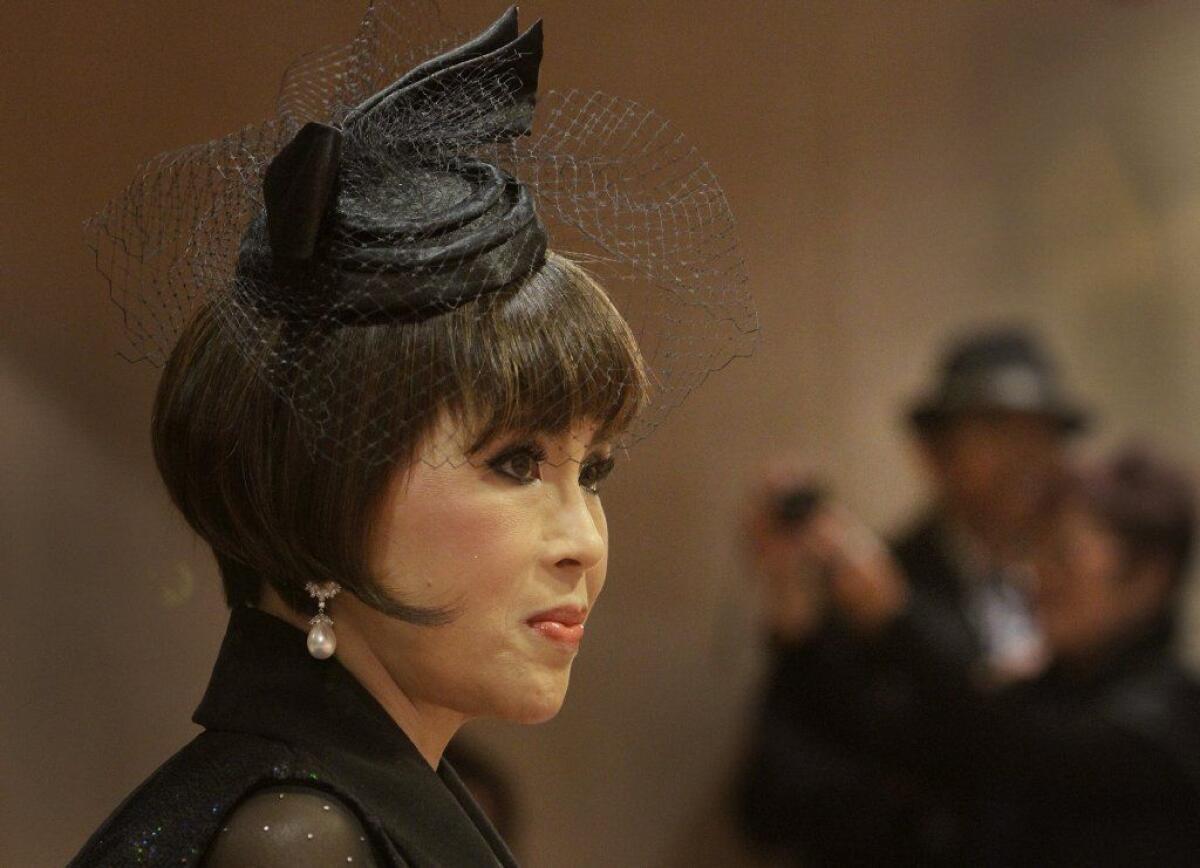Thailand bans political party that nominated ex-princess for prime minister

Reporting from Bangkok — Thailand’s Constitutional Court on Thursday banned the political party that nominated a former princess to run for prime minister, dealing a blow to opposition forces vying to defeat allies of the military-led government in the first election since a 2014 coup.
The court ruled that the Thai Raksa Chart party’s nomination of Ubolratana Mahidol, the eldest child of Thailand’s revered late king and sister to its current monarch, undermined the monarchy and was “hostile to the democratic system.”
The party will be dissolved and its executives barred from politics for 10 years, judges said.
“It is necessary for the Thai monarchy to stay above politics and stay neutral in politics,” Taweekiat Meenakanit, one of the judges, said in a verdict broadcast live on television. “Do not allow any opportunities for the Thai monarchy to be used for political purposes.”

The ruling was not a surprise. The party’s decision last month to nominate the 67-year-old Ubolratana — a UCLA master’s graduate who relinquished her royal title when she married an American in 1972 but is still treated as royalty by Thais — stunned the nation and broke with a more than century-old tradition of the royal family avoiding elected office.
It also raised the prospect of the return of Thaksin Shinawatra, the telecommunications tycoon and former prime minister who is linked to Thai Raksa Chart and lives in exile to avoid corruption charges that he says are politically motivated.
Thaksin is regarded as a dangerous upstart by the military — which ousted him from office in 2006 — and by supporters of the royal family, who regard him as insufficiently deferential to the monarchy.
The nomination of a royal to lead a Thaksin-linked party suggested a rapprochement that could have ended more than a decade of political clashes between rival Thai political factions that have occasionally turned deadly.
But the nomination was short-lived. The party withdrew her candidacy after her brother and Thailand’s current monarch, King Maha Vajiralongkorn, called it “extremely inappropriate.”
Election officials formally canceled her nomination days later and asked the Constitutional Court to punish the party, which led to Thursday’s ruling.
The ex-princess did not appear for the verdict but responded on Instagram, where photos on her private account indicated she was in Berlin. Followers commented that the party had been dissolved, to which Ubolratana responded: “It is sad and depressing.”
Human rights groups denounced the verdict, saying it would diminish the fairness of the March 24 election that the Thai military has held up as a sign of the country’s return to democratic rule.
“This decision highlights the Thai authorities’ abuse of judicial powers to restrict the peaceful association and expression of the political opposition,” Amnesty International’s Thailand campaigner, Katherine Gerson, said in a statement.
“This far-reaching measure raises strong concerns about the human rights to freedom of association and expression in the period leading to the elections.”
Two parties associated with Thaksin have previously been banned, and his sister Yingluck was removed as prime minister in 2014, the most recent of more than a dozen coups in Thailand’s modern history.
Constitutional changes enacted by the junta since 2014 have given the military power to appoint members of the upper house of parliament, while making it more difficult for major parties such as Pheu Thai — the largest Thaksin-backed party — to win large numbers of seats in the lower house.
Both houses vote to select the prime minister, giving the military outsize influence over the winner.
Thai Raksa Chart was formed just four months ago as one of several Pheu Thai offshoots in a bid to secure more parliamentary seats for pro-Thaksin candidates.
Thai Raksa Chart’s nomination gamble, and the court’s ruling, have left that strategy in tatters and boosted the chances of the military-backed leader, Prime Minister Prayuth Chan-ocha, who is running at the head of a pro-military party to remain in power via the ballot box.
“We had pure intentions through the course of our actions,” Thai Raksa Chart’s leader, Preechapol Pongpanich, told reporters after the ruling. “I would like to thank all the candidates and the people who walked side by side with us.”
Special correspondent Amatatham reported from Bangkok and Times staff writer Bengali from Singapore.
More to Read
Sign up for Essential California
The most important California stories and recommendations in your inbox every morning.
You may occasionally receive promotional content from the Los Angeles Times.










